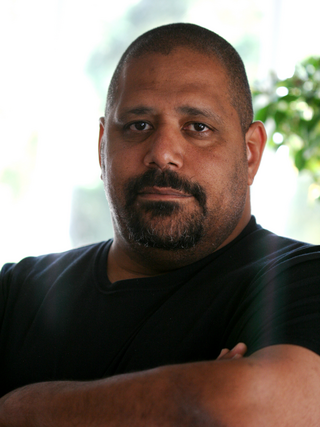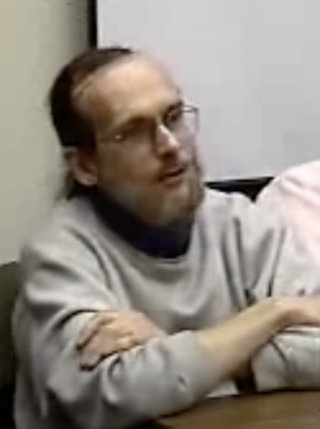
Bash, short for Bourne-Again SHell, is a shell program and command language supported by the Free Software Foundation and first developed for the GNU Project by Brian Fox. Designed as a 100% free software alternative for the Bourne shell, it was initially released in 1989. Its moniker is a play on words, referencing both its predecessor, the Bourne shell, and the concept of rebirth.

Emacs Lisp is a Lisp dialect made for Emacs. It is used for implementing most of the editing functionality built into Emacs, the remainder being written in C, as is the Lisp interpreter.

GNU is an extensive collection of free software, which can be used as an operating system or can be used in parts with other operating systems. The use of the completed GNU tools led to the family of operating systems popularly known as Linux. Most of GNU is licensed under the GNU Project's own General Public License (GPL).

GNU Hurd is a collection of microkernel servers written as part of GNU, for the GNU Mach microkernel. It has been under development since 1990 by the GNU Project of the Free Software Foundation, designed as a replacement for the Unix kernel, and released as free software under the GNU General Public License. When the Linux kernel proved to be a viable solution, development of GNU Hurd slowed, at times alternating between stasis and renewed activity and interest.
A multi-user dungeon, also known as a multi-user dimension or multi-user domain, is a multiplayer real-time virtual world, usually text-based or storyboarded. MUDs combine elements of role-playing games, hack and slash, player versus player, interactive fiction, and online chat. Players can read or view descriptions of rooms, objects, other players, and non-player characters, and perform actions in the virtual world that are typically also described. Players typically interact with each other and the world by typing commands that resemble a natural language, as well as using a character typically called an avatar.
In multiplayer online games, a MUSH is a text-based online social medium to which multiple users are connected at the same time. MUSHes are often used for online social interaction and role-playing games, although the first forms of MUSH do not appear to be coded specifically to implement gaming activity. MUSH software was originally derived from MUDs; today's two major MUSH variants are descended from TinyMUD, which was fundamentally a social game. MUSH has forked over the years and there are now different varieties with different features, although most have strong similarities and one who is fluent in coding one variety can switch to coding for the other with only a little effort. The source code for most widely used MUSH servers is open source and available from its current maintainers.
AberMUD was the first popular open source MUD. It was named after the town Aberystwyth, where it was written. The first version was written in B by Alan Cox, Richard Acott, Jim Finnis, and Leon Thrane based at University of Wales, Aberystwyth for an old Honeywell mainframe and opened in 1987.
The hacker culture is a subculture of individuals who enjoy—often in collective effort—the intellectual challenge of creatively overcoming the limitations of software systems or electronic hardware, to achieve novel and clever outcomes. The act of engaging in activities in a spirit of playfulness and exploration is termed hacking. However, the defining characteristic of a hacker is not the activities performed themselves, but how it is done and whether it is exciting and meaningful. Activities of playful cleverness can be said to have "hack value" and therefore the term "hacks" came about, with early examples including pranks at MIT done by students to demonstrate their technical aptitude and cleverness. The hacker culture originally emerged in academia in the 1960s around the Massachusetts Institute of Technology (MIT)'s Tech Model Railroad Club (TMRC) and MIT Artificial Intelligence Laboratory. Hacking originally involved entering restricted areas in a clever way without causing any major damage. Some famous hacks at the Massachusetts Institute of Technology were placing of a campus police cruiser on the roof of the Great Dome and converting the Great Dome into R2-D2.
Incompatible Timesharing System (ITS) is a time-sharing operating system developed principally by the MIT Artificial Intelligence Laboratory, with help from Project MAC. The name is the jocular complement of the MIT Compatible Time-Sharing System (CTSS).

Computer Science and Artificial Intelligence Laboratory (CSAIL) is a research institute at the Massachusetts Institute of Technology (MIT) formed by the 2003 merger of the Laboratory for Computer Science (LCS) and the Artificial Intelligence Laboratory. Housed within the Ray and Maria Stata Center, CSAIL is the largest on-campus laboratory as measured by research scope and membership. It is part of the Schwarzman College of Computing but is also overseen by the MIT Vice President of Research.
DikuMUD is a multiplayer text-based role-playing game, which is a type of multi-user domain (MUD). It was written in 1990 and 1991 by Sebastian Hammer, Tom Madsen, Katja Nyboe, Michael Seifert, and Hans Henrik Stærfeldt at DIKU —the department of computer science at the University of Copenhagen in Copenhagen, Denmark.
LPMud, abbreviated LP, is a family of multi-user dungeon (MUD) server software. Its first instance, the original LPMud game driver, was developed in 1989 by Lars Pensjö. LPMud was innovative in its separation of the MUD infrastructure into a virtual machine and a development framework written in the programming language LPC.

Brian Jhan Fox is an American computer programmer and free software advocate. He is the original author of the GNU Bash shell, which he announced as a beta in June 1989. He continued as the primary maintainer of bash until at least early 1993. Fox also built the first interactive online banking software in the U.S. for Wells Fargo in 1995, and he created an open source election system in 2008.

Richard Matthew Stallman, also known by his initials, rms, is an American free software movement activist and programmer. He campaigns for software to be distributed in such a manner that its users have the freedom to use, study, distribute, and modify that software. Software which ensures these freedoms is termed free software. Stallman launched the GNU Project, founded the Free Software Foundation (FSF) in October 1985, developed the GNU Compiler Collection and GNU Emacs, and wrote all versions of the GNU General Public License.
MicroMUSE is a MUD started in 1990. It is based on the TinyMUSE system, which allows members to interact in a virtual environment called Cyberion City, as well as to create objects and modify their environment. MicroMUSE was conceived as an environment to allow people in far-flung locations to interact with each other, particularly college students with Internet access. A core group of users remain active.
TinyMUCK or, more broadly, a MUCK, is a type of user-extendable online text-based role-playing game, designed for role playing and social interaction. Backronyms like "Multi-User Chat/Created/Computer/Character/Carnal Kingdom" and "Multi-User Construction Kit" are sometimes cited, but are not the actual origin of the term; "muck" is simply a play on the term MUD.
Emacs, originally named EMACS, is a family of text editors that are characterized by their extensibility. The manual for the most widely used variant, GNU Emacs, describes it as "the extensible, customizable, self-documenting, real-time display editor". Development of the first Emacs began in the mid-1970s, and work on GNU Emacs, directly descended from the original, is ongoing; its latest version is 29.4, released June 2024.

Copyleft is the legal technique of granting certain freedoms over copies of copyrighted works with the requirement that the same rights be preserved in derivative works. In this sense, freedoms refers to the use of the work for any purpose, and the ability to modify, copy, share, and redistribute the work, with or without a fee. Licenses which implement copyleft can be used to maintain copyright conditions for works ranging from computer software, to documents, art, and scientific discoveries, and similar approaches have even been applied to certain patents.

David A. Moon is a programmer and computer scientist, known for his work on the Lisp programming language, as co-author of the Emacs text editor, as the inventor of ephemeral garbage collection, and as one of the designers of the Dylan programming language. Guy L. Steele Jr. and Richard P. Gabriel (1993) name him as a leader of the Common Lisp movement and describe him as "a seductively powerful thinker, quiet and often insulting, whose arguments are almost impossible to refute".







